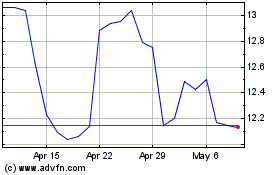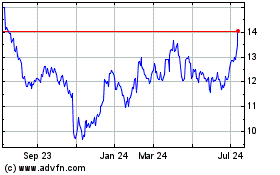German Auto Industry Group Rejects Trump's Talk of Unfair Trade
January 25 2017 - 2:14PM
Dow Jones News
By William Boston
BERLIN -- The German auto industry is pushing back against
accusations from U.S. President Donald Trump that the automotive
trade is unfairly tipped in Germany's favor.
Matthias Wissmann, a former German government official who is
now president of the German Association of the Automotive Industry,
rebutted Mr. Trump's depiction of German-American auto trade as
unfairly tilted toward Germany. He warned against putting up new
barriers that would weaken the North American Free Trade
Agreement.
"Protectionism has never lastingly solved any economic problems
in the world," Mr. Wissmann said in a speech Wednesday evening at
the group's annual New Year's reception in Berlin. "Should it come
to restrictions in the Nafta region, the U.S. economy would be the
first to take a considerable hit."
Mr. Wissmann also pointed to the U.K.'s decision to leave the
European Union and the EU's single market as a major risk for
German auto makers. The U.K. is the largest export market for
German car makers, accounting for 800,000 vehicles last year. He
called on Brussels to do everything possible to ensure that there
is continued free trade in goods and services between the U.K. and
the EU.
The German auto industry is vexed by the new U.S. president's
combativeness. Mr. Trump recently singled out BMW AG, Daimler AG
and Volkswagen AG, threatening to impose a 35% border tax on German
automotive products that are imported into the U.S. from Mexico to
force the companies to build more cars north of the border.
Mr. Trump said that while Daimler's Mercedes-Benz luxury cars
are a common sight in U.S. cities, few Chevrolets can be seen on
the streets in Germany.
Ford Motor Co. and General Motors Co. once dominated the German
auto industry, prompting Adolf Hitler to create Volkswagen as a
German mass market competitor to the U.S. car makers. Today, Ford
and GM, through its Opel subsidiary, are still among the largest
car makers in Germany and Europe. GM recently stopped selling
Chevrolet models in Europe as part of a restructuring, instead
focusing on Opel models.
Mr. Wissmann said the balance of automotive trade was only part
of the picture. German auto makers held a combined 7.6% share of
the U.S. light vehicles market, down from 8% in 2015. By
comparison, GM and Ford have manufactured in Germany for decades,
he said, adding that their share of the German auto market was in
double digits.
The U.S. is the second-largest export market for German auto
makers, Mr. Wissmann said. But he added that German auto companies
and their suppliers have greatly expanded production in the U.S.
over the past few years and export more than half of their
U.S.-made vehicles.
Mr. Wissmann said German manufacturers had increased their U.S.
automotive output fourfold over the past seven years to 850,000
vehicles last year. More than half the vehicles are exported to
other markets, including back to Europe. German car makers and
suppliers employ 110,000 people in the U.S. directly, he said.
"German manufacturers have significantly increased the number of
their factories in the U.S.," Mr. Wissmann said. "This shows clear
commitment to the U.S. as a manufacturing location."
Write to William Boston at william.boston@wsj.com
(END) Dow Jones Newswires
January 25, 2017 13:59 ET (18:59 GMT)
Copyright (c) 2017 Dow Jones & Company, Inc.
Ford Motor (NYSE:F)
Historical Stock Chart
From Mar 2024 to Apr 2024

Ford Motor (NYSE:F)
Historical Stock Chart
From Apr 2023 to Apr 2024
